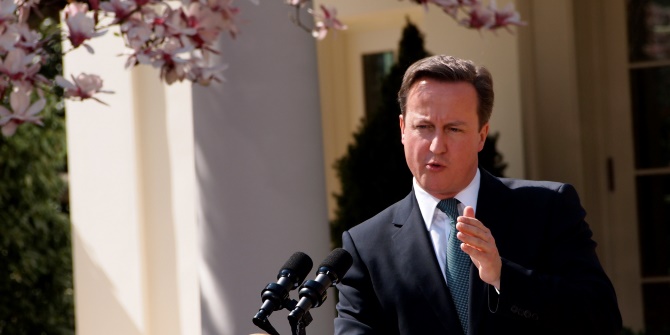Robin Archer previews an upcoming conference and public event on Ralph Miliband’s political legacy and how it might be able to inform future trends in the Labour Party – especially as it relates to the interaction between parliamentary and extra-parliamentary politics, and Labour’s ambiguous attitude towards capitalism.
Should the Labour party support the activists occupying parts of the City of London? What about the thousands of students protesting against the abolition of public funding for university teaching? Or the millions of trade unionists striking to protect their pensions? And as wave after wave of the financial crisis rolls in, with the morality and the efficiency of capitalism in doubt, what should Labour’s attitude to capitalism be?
Questions like these have pressed themselves to the fore in recent months. But as Ralph Miliband showed in Parliamentary Socialism: A Study in the Politics of Labour, they have posed perennial dilemmas for the Labour party since its foundation. This year marks the fiftieth anniversary of Miliband’s book. Its critique of the Labour party shaped a generation of scholars and activists, and its emphasis on the crucial importance of extra-parliamentary politics and social protest as agents of change had a powerful effect on the emerging New Left. But what is striking now about Parliamentary Socialism is the contemporary resonance of its key themes. Despite all the changes that have taken place during Labour’s second half century, many of the same basic dilemmas remain.

Ralph Miliband was intimately involved with the LSE and especially its Political Sociology program for many years. His successors in the Department of Sociology’s Politics and Society group have organized a conference and public lecture to mark the 50th anniversary of his book. With protest on the rise and Labour seeking a new way forward after the demoralization of the Blair an Brown years, these events seek to reassess Miliband’s argument and ask what lessons they hold for us today.
Parliamentary Socialism has two main themes. The first concerns the relationship between parliamentary and extra-parliamentary politics. According to Miliband, a belief in and commitment to the centrality and priority of parliamentary politics often led Labour’s leaders to undermine the very movements that were needed to bring about real social change. They repeatedly urged the labour movement and other supporters to abjure strikes or any other form of direct action aimed at changing public policy, even when a conservative government had no democratic mandate for the policy or had itself acted unconstitutionally.
The reasons for this are less to do with personal timidity and a desire for respectability – the “song of sell out” – than with calculations about electoral incentives, risks of endangering organizations built up over decades, and fears of a lack of working class support. But the root cause is a deep commitment to parliamentary norms, and a failure to recognize that many of Labour’s objectives could never be achieved without marshalling strength outside of parliament.
As the current financial crisis makes particularly clear, the power of economic elites to resist changes that threaten them does not rest purely or even largely on parliamentary numbers, but rather on the ability to command extra-parliamentary power as a result of their control of critical economic resources. It is the ‘markets’, not the voters, to which the British government and all its more or less beleaguered European counterparts explicitly appeal for their mandate to pursue austerity and profound changes in public policy.
What Parliamentary Socialism does not tell us is what an appropriate relationship between parliamentary and extra- parliamentary politics might look like and how it might be achieved. American experience during the Great Depression suggests that major social and political realignments depend on a mutually reinforcing relationship between parliamentary and extra-parliamentary politics. The great reforms of the New Deal (and the long electoral dominance of the Democratic Party which it inaugurated) could not have happened without the growth of a powerful new union movement – the CIO – a movement that was built with occupations and sit-ins. But this new union movement itself could not have succeeded without the rhetorical and legislative support of the Roosevelt administration and its Congressional supporters. Thinking through how such a mutually supportive relationship might be established should be a pressing issue for contemporary Labour politics.
The second main theme of Parliamentary Socialism concerns the Labour Party’s persistent ambiguity of purpose, and in particular its ambiguous attitude towards capitalism. According to Miliband, this ambiguity about capitalism has beset the Labour party since its inception. Unlike in European social democratic parties, “the strategists of the Labour party were not theoretical revisionists because they had never, so to speak, been visionists.” The result was a chronic state of internal party crisis and conflict. “Like Hobbes and Fear,” he writes, “crisis and the Labour party have always been twins.”
But within this persistent state of ambiguity, Miliband detected an evolution of attitudes. Having extricated itself from the Liberal party’s embrace, Labour adopted, not socialism, but “labourism” – a belief that piecemeal collectivism and greater regulation within a predominantly capitalist order would lead to greater welfare, economic efficiency, and social justice. The Attlee government marked the apogee of labourism. Thereafter, a kind of unstable paralysis set in, with some pushing for a fuller rejection of capitalism and others like Hugh Gaitskell pushing for its fuller acceptance and seeing Labour’s task as the civilization of capitalism rather than, in however far distant a future, its supersession.
We can of course continue to trace this evolution into more recent decades. In one sense the rise of Tony Blair and New Labour marked its denouement, with Labour setting aside even the aspiration to civilize capitalism, and largely accepting not just its general permanence and desirability, but the permanence and desirability of the particular extreme neo-liberal form which it took in the 1980s and 90s. But in another sense, this emphatic embrace of capitalism marked a decisive break with Labour’s chronic ambiguity. And yet, amidst a vast unfolding economic and financial crisis, it has proved to be a less decisive break than it once seemed. While the fear of being labeled anti-business remains, the reform of capitalism is back on the agenda. This nascent agenda builds on a distinction between productive and predatory practices – a distinction underpinned in turn by an extensive scholarly literature about ‘varieties of capitalism’.
But with the legitimacy of capitalism being questioned even by some of its erstwhile high priests, what is the positive alternative to which Labour aspires? In Parliamentary Socialism the defining feature of a socialist alternative to capitalism is the predominance of public ownership of major economic assets. But capitalism has at least three defining characteristics. It is a system of private ownership. It is a system of market coordination. And it is also a system of authority relationships between employers and workers – or, as the law rightly describes them, masters and servants. This last characteristic, as Miliband points out, has intermittently captured the imagination of the Labour party. It suggests the possibility of a different kind of socialist alternative – one built on the idea of economic democracy.
Please read our comments policy before posting.
 The conference on ‘Ralph Miliband and Parliamentary Socialism’ will take place on Friday 25 November 2011, from 1pm – 5.30pm in the Morishima Conference Room at the LSE. Speakers include Tariq Ali, Robin Archer, Robin Blackburn and Hilary Wainwright. The conference is open to faculty, researchers and postgraduate students but booking is essential. To register for a place please email Sociology.events@lse.ac.uk
The conference on ‘Ralph Miliband and Parliamentary Socialism’ will take place on Friday 25 November 2011, from 1pm – 5.30pm in the Morishima Conference Room at the LSE. Speakers include Tariq Ali, Robin Archer, Robin Blackburn and Hilary Wainwright. The conference is open to faculty, researchers and postgraduate students but booking is essential. To register for a place please email Sociology.events@lse.ac.uk
The public lecture on ‘Whatever Happened to Parliamentary Socialism: Taking Ralph Miliband Seriously Today’ will take place on Friday 25 November, from 6.30pm – 8pm in the Hong Kong Theatre, Clement House at the LSE. Professor Leo Panitch will be the speaker and Robin Archer will be acting as chair. This event is free and open to all on a first come first served basis.
For more details about both events click here.







